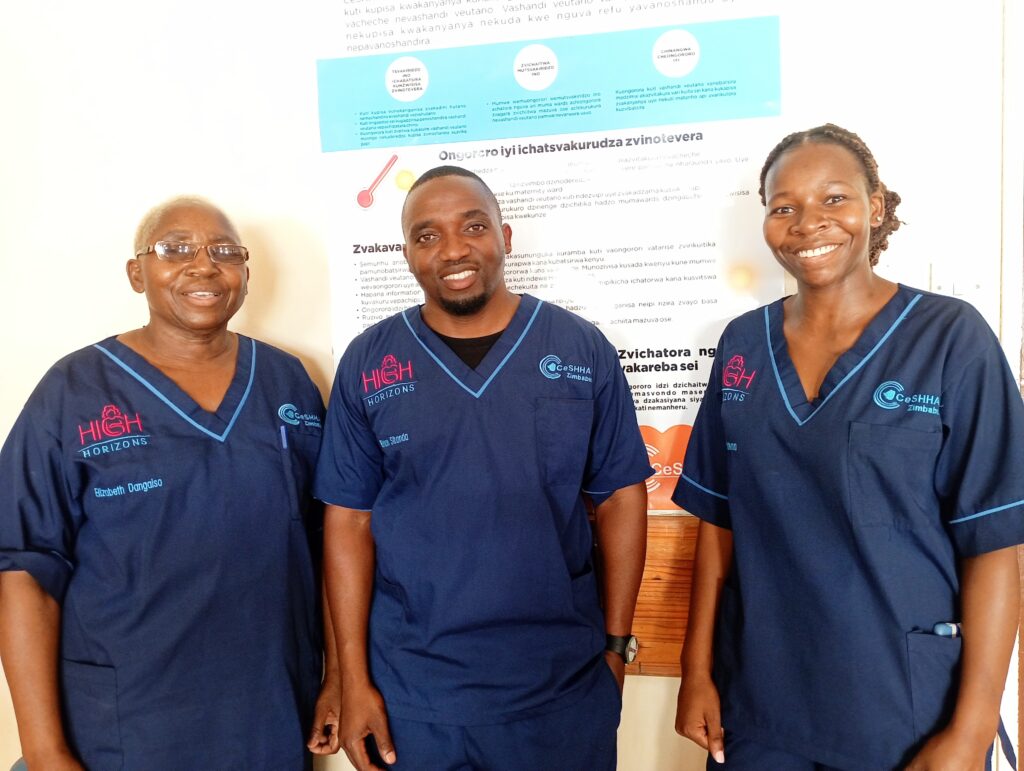In the midst of the scorching heat in Mt Darwin, Zimbabwe, groundbreaking research undertaken by CeSHHAR as part of the HIGH Horizons consortium is shedding light on the effects of extreme temperatures on pregnant and postpartum women, as well as the dedicated healthcare workers who support them. A recent site and support supervision visit was conducted at Mt Darwin Hospital, focusing on the opportunities to intervene against the adverse effects of heat on the health workforce.
At the heart of HIGH Horizons’ research lies the utilisation of four different thermal sensors positioned strategically throughout the hospital. These indoor and outdoor sensors precisely measure temperature, relative humidity, and light intensity within specific areas, providing valuable data for analysis. Three sensors, diligently stationed in the postnatal vaccine room, postnatal beds, and post-delivery room, continuously monitor the environment, while the fourth, a larger sensor, resides in the delivery room.
Additionally, outdoor devices measure wind direction, wind intensity, temperature, relative humidity, and light intensity. This comprehensive approach enables researchers to understand the conditions experienced both inside and outside the hospital. From the data recordings, it was notable that temperature inside the health facility was sometimes 3 degrees higher than the outdoor temperature, creating difficult working environments for healthcare workers.
Thabani Muronzi, CeSHHAR Zimbabwe, emphasized the rationale behind this detailed data collection:
“Our research aims to examine the effects of extreme heat on pregnant women, postpartum women, and the healthcare workers supporting them. By understanding the working conditions they face and the impact of heat on their productivity and effectiveness, we can develop targeted interventions to improve their overall well-being.”
During the site visit, the research team observed the challenges faced by these individuals due to the prevailing heat. They witnessed the hard work and dedication of healthcare workers despite the uncomfortable conditions, however, it was evident that extreme heat was causing adverse effects, including difficulties concentrating and reduced pace of work as well as posing potential risks to their health.
Healthcare workers at Mt Darwin District Hospital, Zimbabwe discussed their experience working in extreme heat, one midwife commented:
“As healthcare workers, we are committed to providing the best care possible for our patients, but the heat adds an extra layer of difficulty to our already demanding jobs. We find ourselves constantly on the go, moving from one patient to the next, all while battling the sweltering heat. It’s not just uncomfortable for us, it’s also affecting the time we can spend with pregnant mothers. We often have to take breaks to find cold water outside the maternity wards just to stay hydrated. Despite these challenges, we remain dedicated to our profession and will continue to provide the best care we can, no matter the conditions.”
CeSHHAR’s research findings will inform future interventions and strategies to adapt to the adverse effects of heat on healthcare workers and mothers. One potential intervention highlighted during the visit was the provision of refrigerators in which healthcare workers could store cold beverages to rehydrate when faced with extreme heat. Such measures will not only enhance their comfort but also contribute to improved productivity and overall job satisfaction.
Another nurse at Mt Darwin District Hospital expressed her gratitude for CeSHHAR’s commitment to understanding their challenges, commenting:
“We are relieved to know that our working conditions are being studied, and necessary steps will be taken to address the impact of heat on us and the women we care for. It gives us hope that our wellbeing is being prioritised.”
CeSHHAR’s research initiative, supported by partnerships with organisations such as the European Commission, and the Ministry of Health, is a testament to their dedication to improving the lives of vulnerable populations. By identifying and addressing the unique challenges associated with climate change and its effects on health, CeSHHAR is paving the way for evidence-based interventions that protect and promote the well-being of pregnant women, new mothers, and healthcare workers.
As HIGH Horizons continues its tireless efforts to understand the impact of extreme heat and develop effective interventions, the future shines brighter for Mt Darwin’s health workforce. Through collaboration, research, and compassion, they are creating an environment where healthcare workers and mothers can thrive, ensuring a healthier future for all.
The HIGH Horizons project has received funding from Horizon Europe under Grant Agreement number 101057843. Project partner LSHTM is funded by UKRI Innovate UK reference number 10038478.

